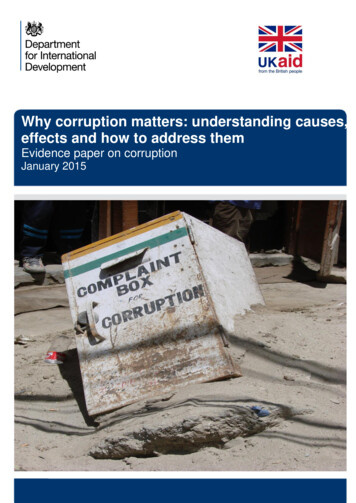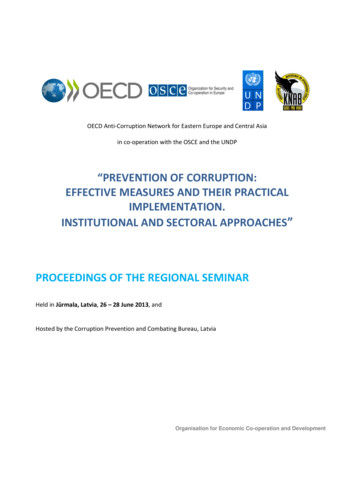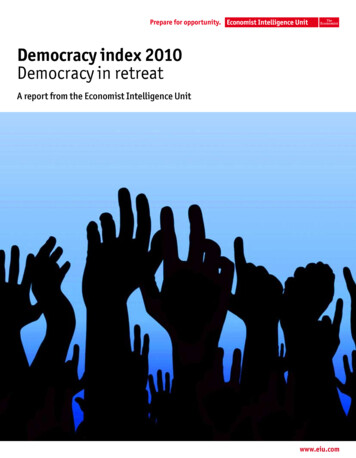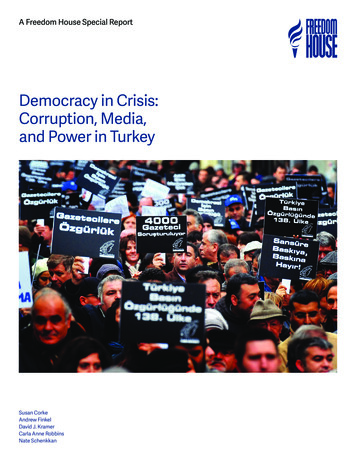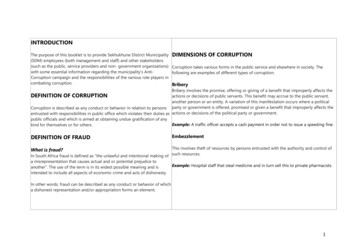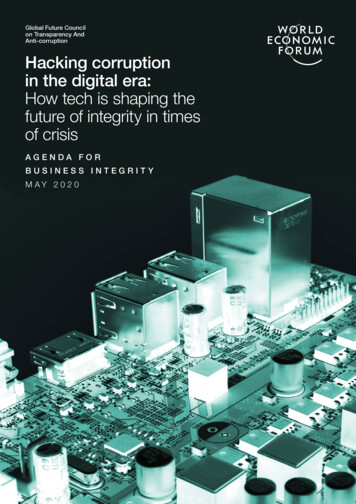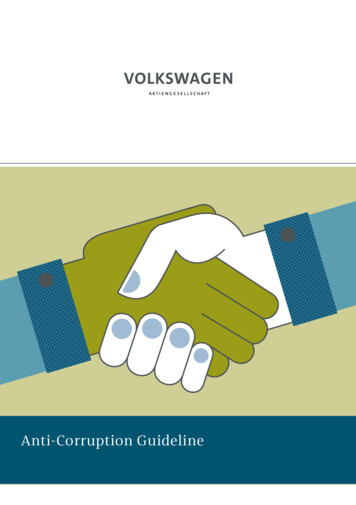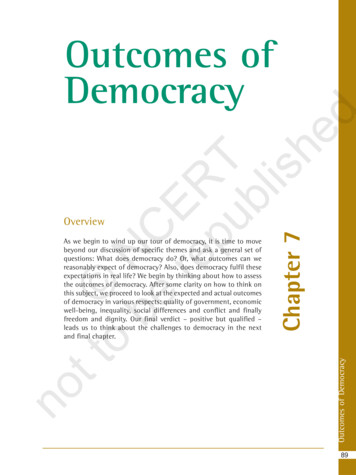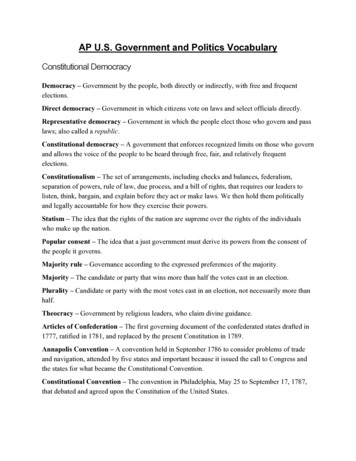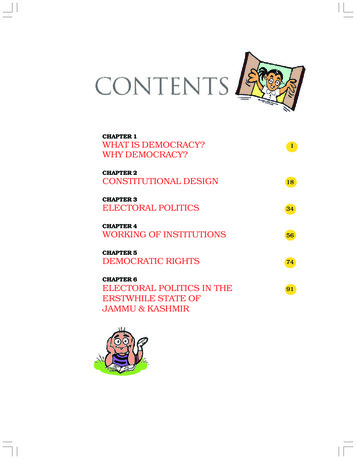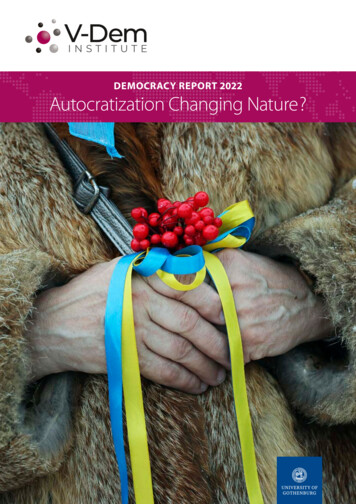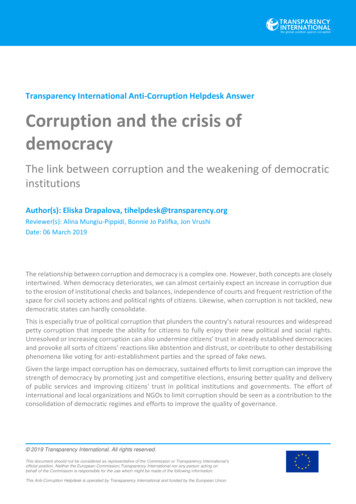
Transcription
Transparency International Anti-Corruption Helpdesk AnswerCorruption and the crisis ofdemocracyThe link between corruption and the weakening of democraticinstitutionsAuthor(s): Eliska Drapalova, tihelpdesk@transparency.orgReviewer(s): Alina Mungiu-Pippidi, Bonnie Jo Palifka, Jon VrushiDate: 06 March 2019The relationship between corruption and democracy is a complex one. However, both concepts are closelyintertwined. When democracy deteriorates, we can almost certainly expect an increase in corruption dueto the erosion of institutional checks and balances, independence of courts and frequent restriction of thespace for civil society actions and political rights of citizens. Likewise, when corruption is not tackled, newdemocratic states can hardly consolidate.This is especially true of political corruption that plunders the country’s natural resources and widespreadpetty corruption that impede the ability for citizens to fully enjoy their new political and social rights.Unresolved or increasing corruption can also undermine citizens’ trust in already established democraciesand provoke all sorts of citizens' reactions like abstention and distrust, or contribute to other destabilisingphenomena like voting for anti-establishment parties and the spread of fake news.Given the large impact corruption has on democracy, sustained efforts to limit corruption can improve thestrength of democracy by promoting just and competitive elections, ensuring better quality and deliveryof public services and improving citizens' trust in political institutions and governments. The effort ofinternational and local organizations and NGOs to limit corruption should be seen as a contribution to theconsolidation of democratic regimes and efforts to improve the quality of governance. 2019 Transparency International. All rights reserved.This document should not be considered as representative of the Commission or Transparency International’sofficial position. Neither the European Commission,Transparency International nor any person acting onbehalf of the Commission is responsible for the use which might be made of the following information.This Anti-Corruption Helpdesk is operated by Transparency International and funded by the European Union.
QueryWhat is the relationship between corruption and the crisis of democracy?Contents1. What do we exactly mean bydemocracy?2. Can democracy contribute to tacklingcorruption?3. The limits of democracy on the controlof corruption4. Can we talk about the crisis ofdemocracy?5. How does corruption contribute to thecrisis of democracy?6. Does control of corruption strengthendemocracy?7. Conclusions8. ReferencesMain points— Democracy is multi-dimensional concept.— Consolidated democracies are moresuccessful in curbing corruption.— Corruption seriously underminesdemocratic governance.— Sustained efforts to limit corruption andpolitical discretion and the support forsocietal accountability can also have apositive impact on the strength ofWhat do we exactly mean bydemocracy?The relationship between democracy andcorruption is a complex one. Althoughdemocracies are said to be the least corrupt formof government, there is a relatively large number ofdemocracies that have a surprisingly lowcorruption perception index (CPI) score, whilesome openly non-democratic countries andautocracies are relatively successful in reducingcorruption.Before disentangling the relationship betweendemocracy and corruption, we have to be clearabout what we refer to when we talk aboutdemocracy and democratic government.Democracy, like corruption, has no clear andunitary definition. On the contrary, there is a largebody of research with a diverse understanding ofwhich aspects are crucial for a democraticgovernment. Only a few concepts have such longdemocracy and its institutions.lists of possible associated adjectives likedemocracy. We can talk about a liberal, direct,representative or even post-democracy (for anexhaustive list of adjectives see Collier andLevitsky 1997). This section, briefly distinguishesthese different concepts and finds a definition ofdemocracy as a guide in the following analysis.The electoral conception ofdemocracyAccording to Schmitter and Karl “modern politicaldemocracy is a system of governance in whichrulers are held accountable for their actions in thepublic realm by citizens, acting indirectly throughthe competition and cooperation of their electedrepresentatives” (Schmitter and Karl 1991, 76).This and similar conceptions are known as the“electoral democracy definition”. In this a2Transparency International Anti-Corruption HelpdeskCorruption and the crisis of democracy
minimalist conception where the backbone ofdemocracy is vertical electoral accountability. Inother words, the election of the ruling elite is based“on the formal, universal right to vote and free,competitive and regular elections (Merkel 2004,34).”However, many authors criticise that idea ofequating democracy to a struggle for an electionamong competing candidates as being toominimal. According to authors like Pippa Norris,the fairness and correct execution of elections aredifficult to judge and determine (Norris 2012). Acomprehensive definition of democracy has to gobeyond simple electoral contests to include otheraspects such as the existence of the rule of law,institutional checks and balances, and respect forthe rights of minorities (Merkel 2004, 37). Also, thisdefinition is not very useful for our analysis of thelink between corruption and democracy as itfocuses only on the electoral arena.More than just free elections: Amultidimensional definition ofdemocracyA large number of researchers go beyond theelectoral aspects of democracy and try to capturethe complex institutional variation that existsbetween democratic systems (Morlino 2004). Theyadd other dimensions to the definition: thedeliberative and participatory aspects as well asthe rule of law, responsiveness, freedom andequality, respect for independent institutions, andchecks and balances (Ercan and Gagnon 2014;Morlino 2004; Munck 2016). The democraticparticipation aspect guarantees citizens’involvement in the democratic process and thatpolicy outcomes reflect citizens’ will. The rule oflaw denotes supremacy of laws that limitpoliticians’ powers and will. Institutional checksand balances refer to the interplay betweeninstitutional responsiveness and societalaccountability. In this case, independent tribunalsand administration act as effective controls ofpoliticians and ensure the correct and impartialimplementation of public policies and redistributionof public resources (Rothstein 2017, 2014).democracy". At the core of this concept are fiveinterdependent components: i) democraticelection, ii) political participation rights; iii) civilrights; iv) horizontal accountability; v) and effectivepower to govern (Merkel 2014, 14).The competitive electoral process is at the heart ofmodern democracies, but other factorscomplement it. The democratic electioncomponent refers to the electoral game, and it isequivalent to the “electoralist” democracydefinition. Freedom of speech, association andprotest form the "political participation rightscomponent". Civil rights provide protection fromillegitimate state interference into the life of anindividual and are therefore linked to the protectionof minorities, individual liberty and property.Horizontal accountability ensures the mutualinterdependence and autonomy of the legislative,executive and judicial power as well as thefunctioning of oversight institutions such as auditinstitutions and ombudsmen (checks andbalances). Finally, the effective power to governensures that only "those elected are entitled tomake binding political decisions without theinterference of other actors or interest groups likethe military” (Merkel 2014, 16).For Merkel, a fully-fledged democracy is a systemwhere these five components are balanced andclosely related, what he calls mutually embedded.He also acknowledges the role of externalconditions that shape (stabilise or undermine)democratic governance, such as civil societystrength, socio-economic context (economic crisisor growth) and international collaboration withindifferent international organisations.According to Merkel, this definition of embeddeddemocracy is at the right level to empiricallyassess the performance of democracies. It is morecomprehensive than the limited electoral definition,and it also avoids mixing components ofdemocratic regimes with normative outcomes, likesocial justice or redistribution, that are part ofmaximalist models of democracy. Following thisreasoning, this query uses Merkel’s embeddeddemocracy components as the starting point tostructure the debate around the relationshipbetween democracy and corruption.These points were summarised and systematisedby Wolfgang Merkel's concept of "embedded3Transparency International Anti-Corruption HelpdeskCorruption and the crisis of democracy
Can democracy contribute totackling corruption?From a look at the CPI scores and the existingresearch, it seems that democracy is the leastcorrupt form of government (Drury, Krieckhaus andLusztig 2006; Moss, Pettersson and van de Walle2006; Kotera, Okada and Samreth 2012). Thereason that many scholars find democraticcountries more successful at curbing corruption ,defined by Transparency International as an abuseof entrusted power for private gain)1 is the conjunctaction of factors mentioned above (the rule of law,checks and balances, societal and electoralaccountability, civil rights and effective power togovern) that limit discretionary power and increasethe responsibility of political representatives.The principal democratic mechanism that cancontribute to curbing corruption is the democraticelectoral process. The electoral competition andthe desire for re-election constrain, at least intheory, the greed of politicians (Rose-Ackerman1999 and Palifka 2016; Drury, Krieckhaus andLusztig 2006). Frequent and competitive electionswork as a mechanism for the selection of bettercandidates (Kunicová and Rose-Ackerman 2005;Golden and Chang 2001; Bågenholm 2013;Montinola and Jackman 2002). New parties needto build a good reputation, so they are generallyless corrupt (Broms, Dahlström and Fazekas 2017;Klašnja 2015). Moreover, electoral competitionworks as a sanctioning mechanism, where corruptpoliticians and parties can be voted out of theoffice (Bågenholm 2013; Chong et al. 2011; Broms2018).However, it is important to note that many studiesalso find that this beneficial effect of competitiveelections is mediated by the type of corruption(Fernández-Vázquez, Barberá and Rivero 2016;Riera et al. 2013; Montero et al. 2011), presenceof alternative candidates (Esarey and SchwindtBayer 2018; Charron and Bågenholm 2016), sizeof circumscription (Carreras 2017) or electoralsystem (Tavits 2007; Golden and Chang 2001).1Political rights constitute freedom of speech, andthe right to demonstrate and associate.Democracies allow for the plurality of opinions andtheir expression in a free press, and the possibilityto organise and voice disagreement with thegovernments. These factors are essentialconditions for societal accountability, transparencyand collective action that restrict the possibility ofpolitical abuse of power for private gain (Lindstedtand Naurin 2010; Charron 2009). The researchshows that a free press and media contributesignificantly to greater accountability and lowercorruption (Chowdhury 2004; Brunetti and Weder2003).Civil rights grant liberty and property, and protectcitizens from illegitimate state interference.According to Rose Ackerman (1999), theprotection of civil liberties and free speech that arepart of democratic constitutions make transparentand non-corrupt government possible. Active andindependent civil society can exercise control andlimit the arbitrariness of government. Social capitaltheories maintain that more participative and civicminded citizens will act as watchdogs, alertingagainst corruption and adding an extra layer ofaccountability (Putnam, Feldstein and Cohen2004; Putnam, Leonardi and Nanetti 1994; Putnam2000). This proposition is supported by empiricalstudies that found that societies in which socialnetworks are abundant and social trust is highhave less corruption (Rothstein and Uslaner 2005;Rothstein and Stolle 2009). Protection of minoritiesand female empowerment are also crucial aspectsthat limit corruption. Stensöta and Wängnerud’sresearch finds that democracies with higher levelsof gender equality in the political system lead tolower levels of corruption (Stensöta andWängnerud 2018).The Gambia recently improved in terms of controlof corruption, mainly in the areas of electoral rightsand electoral competition (Rahman 2019). It wasmainly the change of government that allowed fora renewal of anti-corruption commitments and astrengthening of political rights and freedoms. Thenew government enacted freedom of press andestablished the Commission that would investigatecrimes committed by the previous government,including corruption. The Gambia jumped 7 orruption4Transparency International Anti-Corruption HelpdeskCorruption and the crisis of democracy
in the CPI from last year and saw one of thelargest improvements on the Freedom in the Worldindicators, registering a 21-point increase (with asubstantial increase from not free to partly free).Moreover, democracy is a system built on effectivehorizontal accountability. In other words, it isbased on the idea that the legislative, executiveand judicial powers should be balanced andshould mutually check each other (Collier andLevitsky 1997). Notably, the rule of law andindependence of the judiciary are essential for theeffective control of corruption (Voigt and Gutmann2015; Elbasani and Šabić 2017). When politiciansor civil servants abuse power for their personalenrichment, the tribunals should ensure correctand timely punishment and provide impartialapplication of the law to everyone.Stefan Voigt and Jerg Gutman researched theeffects of judicial organisation and independenceon the level of corruption. They show that judicialindependence, as well as that of prosecutionagencies, is correlated with lower levels ofcorruption (Voigt and Gutmann 2015). Besides, theeffectiveness of the rule of law and the judiciary isdirectly related to the peoples' reasoning about thecosts and benefits of corruption (Lambsdorff 2002,2012). According to rational choice theory, peopleweigh the gains from corrupt dealing against theprobability of detection and the expected size ofpunishment. If the probability of being punished orthe size of the penalty are low, the legal actionsare not performing as a deterrent for people toengage in corruption (Becker 1968; RoseAckerman 1975). For instance, low fines forembezzling and non-existing asset recoverylegislation keep corruption profitable even whendiscovered (Rose-Ackerman and Palifka 2018)be explained by the country’s socio-economicdevelopment (Pinto and Zhu 2016). Many otherfactors, such as historical legacies or educationmatter too (Rothstein 2015; Rothstein and Teorell2015; Acemoglu and Robinson 2012; Acemoglu,Johnson and Robinson 2002; Uslaner andRothstein 2016). There is a temptation to load toomany expectations on democracy and to imaginethat, by attaining democracy, society will resolveall of its political, social and economic problemsplus eradicate corruption and abuse of power.Recent scandals in Brazil, Mexico, Spain, Italy andelsewhere show that democracies still suffer fromcorruption. The empirical research concludes thatdemocratisation alone does not easily translateinto lower levels of corruption (Rothstein 2011,Mungiu-Pippidi and Johnston 2017).In fact, corruption often worsens in newlydemocratised countries. Although one wouldassume that the level of corruption falls asdemocracy matures (Kolstad and Wiig 2016),studies that cover a large number of countries andyears show that the relation between the maturityof democracy and level of corruption is not linear(Sung 2004; Rock 2009; Bäck and Hadenius 2008;Montinola and Jackman 2002). In other words, inyoung democracies, the level of corruptionincreases (as there are more opportunities forcorruption but the laws and institutions still have tobe enforced) to consequently fall as thedemocratic regime consolidates and the executive,legislative and judicial powers balance up, creatinga sort of inverted U-shape when plotted over time.The limits of democracy on the controlof corruptionAs described in the previous section, if thedifferent aspects of democracy are balanced, theyallow for the inclusion of interests, representationand participation of citizens, and limit opportunitiesfor corruption. Can we thus conclude that installinga democratic form of government will root outcorruption? This would be too rosy a view. Weknow from the research that some corruption can5Transparency International Anti-Corruption HelpdeskCorruption and the crisis of democracy
Recent research shows that transition to goodgovernance is a long term process where electoralaccountability is only a first step that has to befollowed by effective checks on political power(independent tribunals and media) and active civilsociety. More than making electoral democracywork, it is a state building process (Mungiu-Pippidiand Johnston 2017).Democracy is a multidimensional concept, and notall dimensions are equally consolidated in a givencountry. Merkel points to the possibility of acrisis/deficiency of different democraticcomponents (Merkel 2014). Thus it is possible thatsome countries perform well in one dimension(electoral competition) but have reserves in others(independence of the judiciary or limited socialrights and liberties). Therefore, it is possible thatcorruption "infests" these weak points. Whencorruption extends, it undermines one or more ofthe democratic pillars and can significantly impairthe overall democratic strength. Ultimately, aperverse and vicious circle that reinforcescorruption is installed and further underminesdemocratic processes (Rothstein 2017).Can we talk about the crisisof democracy?The number of democracies increased until 2011,then stabilised around 97. Since then, there isconsiderable instability within the establishedcategories. In other words, there are not manycountries that regress from democracy toautocracy, but there is a larger number ofdemocracies in which electoral competition orliberal values deteriorate (Mechkova, Lührmannand Lindberg 2017). According to the Democracyin Crisis report by Freedom House “71 countriessuffered net declines in political rights and civilliberties, with only 35 registering gains” (FreedomHouse 2018). Once-promising states, such asTurkey, Poland and Tunisia, are now declining indemocratic standards (Freedom House 2018).In line with this finding, Merkel (2004) finds a muchmore pronounced decline in citizens' satisfactionwith democracy and trust in institutions. In Europe,this decline is most prominent in countries withhigh levels of corruption and economic stagnation.Some young democracies are backsliding in thecivil liberties and freedom of expressioncomponents, while transition to democracy haltedin few countries, as in Thailand (Mechkova,Lührmann and Lindberg 2017).Those considered to be consolidated democraciesare also showing signs of democratic backslidingmanifested in long-term fading of traditionalpolitical participation, steep declines in trust andsatisfaction with government and democraticinstitutions, like parties and parliaments. In somecountries, there is a dismantling of the democraticinstitutions, such as independent tribunals,universities and audit institutions (Orban’s attackagainst Central European University, andErdogan’s purging of universities and courts afteran attempted coup).Perhaps the most debated example is in theUnited States decline of political rights, civilliberties and decreasing oversight of politicalinstitutions (Freedom House 2018). The US CPIscore dropped by 4 points, from 75 (2017) to 71(2018). Freedom House downgraded itsdemocracy score from 92 (2015) to 86 points(2018). A similar trend is evident in Bertelsmann'sSustainable Governance Indicators (SGI) wherethe US registers a drop in the quality of democracyscore from 2016 onwards (from 8.07 to 7.4). Theareas that deteriorated most were access toinformation (from 8.7 to 7.3 points) and the rule oflaw (from 8 to 7.3 points).President Trump repeatedly criticized and tried toweaken the Foreign Corrupt Practices Act (FCPA)and made cabinet appointments with potentialconflicts of interest. According to Freedom House,the US democratic institutions have sufferederosion due to violations of fundamental ethicalstandards (false statements by the administration),reduction in government transparency, includingthe president’s refusal to disclose personal taxdata, and erosion of institutional checks andbalances like firing the head of the Federal Bureauof Investigations (FBI) or pressuring the judges(Freedom House 2018).The unresolved problems of current democraciesand economic crises have increased theattractiveness of populist, anti-establishment oreven anti-democratic political forces that furtherendanger the strength of liberal democracies(Mounk and Kyle 2018). Brazil’s corruption6Transparency International Anti-Corruption HelpdeskCorruption and the crisis of democracy
scandals involving the Workers’ Party andworsening of the country’s economic situation ledto the impeachment of President Dilma Rousseff(the Workers’ Party member) and possiblycontributed to the recent electoral victory of JairBolsonaro. Although soon after the elections, wecannot yet see the impact of the vote on thecountry's democratic performance and the level ofcorruption, there is however a fear that Braziliandemocracy will continue its descent in internationalrankings as the newly elected president hasshown, on repeated occasions, anti-democraticand authoritarian tendencies (Mounk and Kyle2018).redistribution of wealth and the allocation of talent(Goldsmith 1999; Dimant and Tosato 2018; Pintoand Zhu 2016). Corruption is associated with braindrain (Mungiu-Pippidi 2015a), environmentaldegradation (Povitkina 2018) and child mortality(Holmberg and Rothstein 2011). However, it alsohurts democracies by undermining the fragilebalance between institutions, and rules and normsthat provide trust and legitimacy of the system.Using the five elements of embedded democracy(Merkel 2004), this sections looks at howcorruption undermines democracy.How is the crisis of democracy linkedto corruption?According to Merkel, if corruption infects ademocratic electoral system, it strikes at the heartof democracy (Merkel 2014, 14). Corruption in theform of electoral fraud and vote buying is the mostfrequent form how incumbents try to remain inpower (Nyblade and Reed 2008; Ziblatt 2009).More resourceful candidates may engage in votebuying, while those less consolidated frequentlythreaten the opposition (Mares and Young 2016;Mares and Zhu 2015; Stokes et al. 2013; Khemani2015). The state budget is a formidable resourceto feed clientelistic networks, so elections arefrequently targeted by corrupt politicians. Likewise,influence peddling and corruption are used to raisefunds for election campaigns.In general, a weakening of democracy and thedeteriorating performance of government may leadto widespread scepticism and dissatisfaction thatcan lead to a higher perception of corruption.Moreover, when one or several aspects of ademocratic regime weakens or enters a crisis,corruption can spread within and infest theremaining components. For example, wheninstitutional checks decrease while the discretionof politicians and the influence of powerfulindividuals is high, corruption extends. Thus wecan say that a crisis of democracy or of itscomponents and corruption reinforce each other.For example, Hungary’s Prime Minister VictorOrbán is continuously dismantling institutionalchecks and balances that would limit his executivepowers. In 2012, he managed to change theconstitution and recently he created a new courtthat would supervise the public administration anddeal with corruption. Hungary’s CPI score hasdropped from 55 to 46 between 2012 and 2018and it registered the worse score in political rightsby Freedom House since its democratic transition.How does corruptioncontribute to the crisis ofdemocracy?It is well established that corruption undermineseconomic growth, decreases state capacity,Free and fair electionsPolitical rights and participationCorruption can provoke changes in votingbehaviour, such as increasing voter abstention,increasing volatility or persistent discriminationagainst minorities, social classes and women.Eventually, corruption erodes the social contractbetween citizens and governments (Lauth 2000,36; Goldberg 2018, 197; Della Porta and Vanucci1997, 537; Warren 2004b; Zyglidopoulos 2016;Sundström 2015).This breach of the social contract can lead toapathy and alienation of citizens from the politicalspace. Agerberg (2018) shows that whencorruption is high, educated citizens are likely tofeel resignation rather than indignation andconsequently withdraw from political participation.In the electoral game, this apathy is translated intolower voter turnout (Stockhammer 2017;7Transparency International Anti-Corruption HelpdeskCorruption and the crisis of democracy
Stockemer, LaMontagne and Scruggs 2013;Carreras and Vera 2018).Monika Bauhr and Nicholas Charron present amore nuanced argument showing that the effect ofcorruption on political participation depends onwhether individuals benefit or not from corruption.Those excluded tend to abstain, whereas thosethat benefit from corruption maintain loyalty to thecorrupt regime (Bauhr and Charron 2017). Thisperverse dynamics further limits the possibility ofelectoral change that would curb corruption.Corruption also affects the strength and ability ofcivil society to participate in the decision-makingprocess (Guiso, Sapienza and Zingales 2010;Grimes 2013; Johnston 2005).Monika Bauhr and Marcia Grimes (2014) showthat, in the Latin American countries, exposure toendemic corruption demobilises the people. Theyfound that, in a highly corrupt environment,transparency tends to breed resignation ratherthan protest (Bauhr and Grimes 2014). Moreover,corrupt regimes frequently repress associationsand organisations that engage with accountabilityand anti-corruption. According to TransparencyInternational findings, civil society organisationsworking on governance issues are subject to evergreater restrictions on their operations whileattacks on journalists are on the rise in many partsof the world. This further undermines the capacityof watchdog organisations and civil society tocontrast corruption. In 2018 in Mexico, the mediareported that several civil society activists,journalists and watchdog organisations working oncorruption were victims of surveillance of theirdigital communication, presumably by governmentagencies (Freedom House 2018).Importantly, countries with high corruption alsolimit female empowerment, representation andequality of opportunities. Research found thatcountries with high corruption have fewer femalerepresentatives in national and regionalparliaments, and higher female electoralabstention (Alexander and Bågenholm 2018).Sundström and Wängnerud (2016) see corruptionas an indication of informal power networks thatbenefit the already privileged and pose a directobstacle to women and ethnic and religiousminorities that are not part of these powernetworks.Civil rightsAs mentioned before, civil rights grant protection ofliberty and property from illegitimate stateinterference. Corrupt governments, particularly incontexts with a culture of impunity, show disregardand at times contempt for human rights, androutinely overstep the reach of the state vis-a-vistheir citizens. A joint study conducted by theInternational Council on Human Rights Policy andTransparency International in 2009 found thatcorruption may lead to violations of civil rights suchas equality and non-discrimination as well as theright to a fair trial (International Council on HumanRights Policy, 2009). In Turkey recent politicalchanges resulted in decline in political and civilrights and undermining the judicial independence.Turkey’s CPI score is declining since 2013 and thisyear, Turkey’s Freedom House rating fell from“partly free” to “not free” (Freedom House, 2018).Furthermore, the selective dispensation of justiceand the illegitimate use of punitive measures bycorrupt courts and law enforcement agencies areother clear examples of the adverse effects ofcorruption on civil rights (Ngugi 2004). Finally,corruption is associated with excessive anddiscretionary use of force by law enforcementagencies (Andersen, 2018; Forné, 2016).Horizontal accountability mechanismsCorruption undermines the balance betweeninstitutions, weakening the oversight ofgovernment, limiting the independence of courtsand oversight agencies, and facilitating thearbitrary implementation of laws. The currentpresident of Guatemala, Jimmy Morales attemptedto suspend the operation of InternationalCommission against Impunity (CICIG) due toinvestigation of corruption linked to his party andfamily members. Guatemala is still being classifiedas only “partly free” by the Freedom House and inCPI scores 27 out of 100.Moreover, when people in a corrupt system feelthat they are not treated equally by the law, theymight resort to in bribery, corruption andclientelism to exert political influence or obtainequal treatment (Marquette and Peiffer 2015; Roseand Peiffer 2015; Porta and Vannucci 2012). As aresult, individuals are almost forced to engage in8Transparency International Anti-Corruption HelpdeskCorruption and the crisis of democracy
corruption and to take on the correspon
democracy is a system of governance in which rulers are held accountable for their actions in the public realm by citizens, acting indirectly through the competition and cooperation of their elected representatives" (Schmitter and Karl 1991, 76). This and similar conceptions are known as the "electoral democracy definition". In this a
